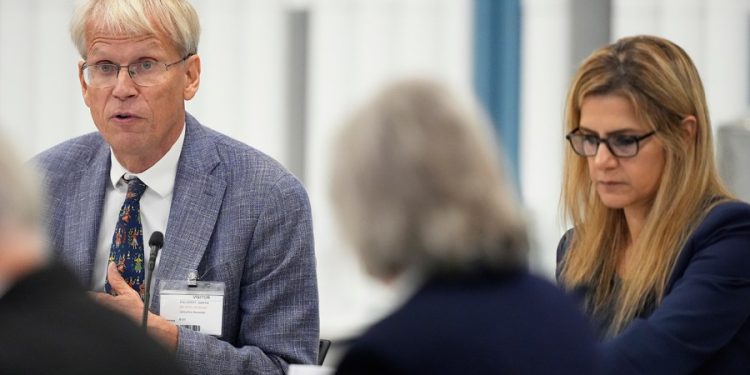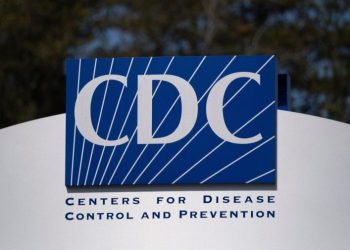A key federal advisory panel handpicked by Health Secretary Robert F. Kennedy Jr spent two chaotic days debating potentially significant changes to the Centers for Disease Control and Prevention’s vaccination policy but left the most controversial recommendation for another time.
The Advisory Committee on Immunization Practices (ACIP) voted on Thursday not to recommend the combined measles, mumps, rubella and varicella (MMRV) vaccine for any patient under 4 years old, reversing current guidance.
Following a lengthy and at times confusing and contentious discussion, the panel declined to vote on a change to the hepatitis B vaccine for newborns.
The panel unanimously adopted a more restrictive recommendation for COVID-19 shots, though the practical implications aren’t yet clear.
The panel’s recommendations carry enormous importance. Most private insurers are required to cover the shots ACIP recommends, and many state policies on vaccines are tied to the committee’s guidelines.
Here are key takeaways.
The childhood vaccine schedule is changing
The panel, chosen by Kennedy after he dismissed the previous panel in June, made its first edit to the childhood vaccine schedule on Thursday.
The committee voted 8-3 to recommend delaying the use of the combined measles, mumps, rubella and chickenpox vaccine. The shot is given to about 15 percent of children nationwide. It carries a slightly elevated risk of febrile seizures.
Instead of a combined shot, the panel recommended two separate vaccines; one against measle, mumps and rubella (MMR) and another for chickenpox.
Despite the relatively low uptake of the combined shot, liaison members from professional medical groups repeatedly pointed out that there was no new evidence to justify the change and urged the panel not to act.
ACIP member Cody Meissner, a professor of pediatrics at the Geisel School of Medicine at Dartmouth, voted against the change. He argued febrile seizures occur in 3 to 5 percent of all children and while scary, they aren’t associated with any sort of impairment. He also said the recommendation removes parental choice.
The MMRV vote likely won’t be the last change to childhood vaccines, as the panel is establishing a working group on childhood and adolescent shots.
No hepatitis B vote
The biggest surprise came when the panel decided to delay a vote on changes to the hepatitis B vaccine schedule. Committee members said they did not feel ready to vote and were confused by the presentations and recommendation language.
The vote was initially set for Thursday but was then postponed to Friday at the last minute because of wording discrepancies in the voting language. But on Friday morning, members voted to indefinitely table the measure.
Panelists still had questions about the safety of the shot, while others did not want to rush forward and make a change without a good reason.
“I believe that there’s enough ambiguity here and enough remaining discussion about safety, effectiveness, and timing that I believe that a vote today is premature,” said panel member Robert Malone.
“We are more prudent when we are cautious,” said Joseph Hibbeln, a psychiatrist and neuroscientist formerly at the National Institutes of Health, said.
The move was applauded by infectious disease experts, as well as Sen. Bill Cassidy (R-La.). Cassidy had been sounding the alarm in recent weeks about the potential for serious harm if the 34-year policy of vaccinating all newborns against hepatitis B at birth were rolled back.
“President Trump and I agree: vaccines save lives. If a mom wants to get a lifesaving hepatitis B vaccine to protect her newborn, she should be able to get it,” Cassidy said in a statement. “The proposed ACIP recommendation could have put that access at risk, making it harder for that mom or that parent to protect their child against hepatitis B. Postponing the vote was the right call.”
Inexperience and confusion are on display
The decision to delay a vote indefinitely was just one sign of the panel’s inexperience and broad confusion over the voting process. About half of the committee members were appointed to the panel earlier this week.
Separately Friday, the panel decided to hold a re-vote on whether the combined measles, mumps, rubella and varicella (MMRV) vaccine should be covered under the Vaccines for Children (VFC) program, which provides low-cost or free vaccines for about half of the children in the country who are uninsured or on Medicaid.
The panel initially voted in favor, but the wording of the question confused some members, who asked what they were voting for. One person abstained from the vote, citing confusion.
So on Friday, they re-voted and reversed the previous day’s decision.
COVID uncertainty
The panel’s vote Friday added more uncertainty about who can get COVID-19 vaccines, and how.
The panel unanimously recommended people speak with their doctor about getting the COVID-19 shot. They didn’t recommend vaccination, but they didn’t recommend against it either.
The vote marked a departure from the current universal recommendation, but it’s not clear what the practical impact will be. The decision, if signed off on by federal health leaders, would likely preserve insurance coverage for the shots.
It could also create complications for Americans who want to get vaccinated in a pharmacy without a prescription, depending on their state.
CDC data presented Friday found about two-thirds of adults who received a COVID shot last year got it at a pharmacy.
Reactions were mixed.
The AARP, for instance, criticized the move away from a universal recommendation.
“If you want a vaccine, you should be able to get one. AARP is concerned by the CDC’s advisory panel decision, which could make it harder for older Americans to access COVID-19 vaccines that are proven to protect their health,” the group said in a statement.
So did Sen. Patty Murray (D-Wash.)
“The decision by this ACIP panel—newly reconstituted with unqualified vaccine skeptics—to limit access to COVID vaccines is deeply disturbing and not based in science,” Murray said. “RFK Jr.’s handpicked ACIP members say this is somehow about ‘individual decision-making,’ but their vote today means that many Americans who want the COVID vaccine may not be able to get it.”
Sanofi, which sells the non-mRNA COVID shot developed by Novavax, said it was “encouraged that the Committee voted to recommend COVID vaccines.”
More changes coming
In what was likely a sign of changes to come, the COVID discussion Friday included non-vetted presentations that promoted popular anti-vaccine talking points, including claims that the vaccines were contaminated, and can cause cancer and birth defects.
Hundreds of millions of people in the United States have received COVID-19 vaccines, and billions have received them worldwide. There is no evidence of those assertions.
But Food and Drug Administration senior adviser Tracy Beth Høeg did not outright deny any of the claims and said only that the agency takes public safety seriously.
A Pfizer official told the panel that the study on birth defects found them during the first trimester, and the women in the study received the vaccine later in pregnancy.
Vaccine makers, who normally are allowed to present data during ACIP meetings, were limited to a brief phone call of a few minutes. Pfizer took the time to say its vaccine saved between five and seven thousand lives in the last year.
Retsef Levi, the ACIP panelist who leads the coronavirus vaccine work group, gave a presentation accusing the CDC of not effectively communicating the risks of the vaccine.
Levi is a known critic of the mRNA vaccines and has previously called for them to be removed from the market.















